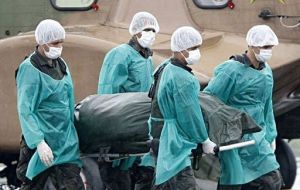MercoPress. South Atlantic News Agency
Flight 447: Airlines rush to change Airbus speed sensors
 Brazilian Air Force personnel unload from a chopper the corpse of one of the passengers (Photo AFP)
Brazilian Air Force personnel unload from a chopper the corpse of one of the passengers (Photo AFP) As Brazilian divers continue to recover bodies and remains of Air France Flight 447 wreckage, airlines worldwide are scrambling to replace plane speed sensors on a number of Airbus jets in the aftermath of the accident.
Investigators looking into what may have caused the accident believe speed sensors malfunctioned on the flight. The problem could have caused the plane to fly at an unsafe speed. Delta, US Airways and United, which fly a different model of Airbus, are rushing to finish replacing their sensors. Faulty speed readings can cause the jet to fly dangerously slow or fast.
It's not known for sure if the sensors contributed to the crash nine days ago, but pilots at Air France aren't taking chances and they have pressured the airline to quickly upgrade the speed sensors, called pitot’ tubes.
“We are really concerned,” said Louis Jobard at Air France's pilots' union. “We have had some incidents, you know, before, reported on the Airbus 330 and Airbus 340 with the old type of pitot sensor.”
The speed sensor changeover was recommended by Airbus 17 months ago, but it's common for airlines to take their time on non-critical work. Airbus had recommended changing the sensors because of reliability issues, and Air France had noticed sensors icing up on some flights.
The sensors had not yet been changed on flight 447, which former National Transportation Safety Board managing director Peter Goelz said was “not unusual.”
“The recommendation that was made to Air France was not an emergency recommendation,” Goelz said Tuesday. “It was a recommendation that could be completed over time. And given the economics of the airline industry now, no air carrier wants to take their plane out of service unnecessarily.”
Meantime a French nuclear submarine is expected to arrive Wednesday to look for the plane’s black boxes.
On Monday, the US Navy sent a team and two underwater, high-tech listening devices used in military crashes. The devices are towed behind a boat to listen for the “pinging” signal emitted from the plane's cockpit voice recorder and flight data recorders. They can detect the black boxes at depths of 20,000 feet and have been used in military accidents.
Those recorders could also tell investigators whether the pilots tried to turn back toward land. Investigators believe may have been the case, based on the location of the wreckage and bodies. The boxes' locator signals may last just 21 more days.




Top Comments
Disclaimer & comment rulesCommenting for this story is now closed.
If you have a Facebook account, become a fan and comment on our Facebook Page!